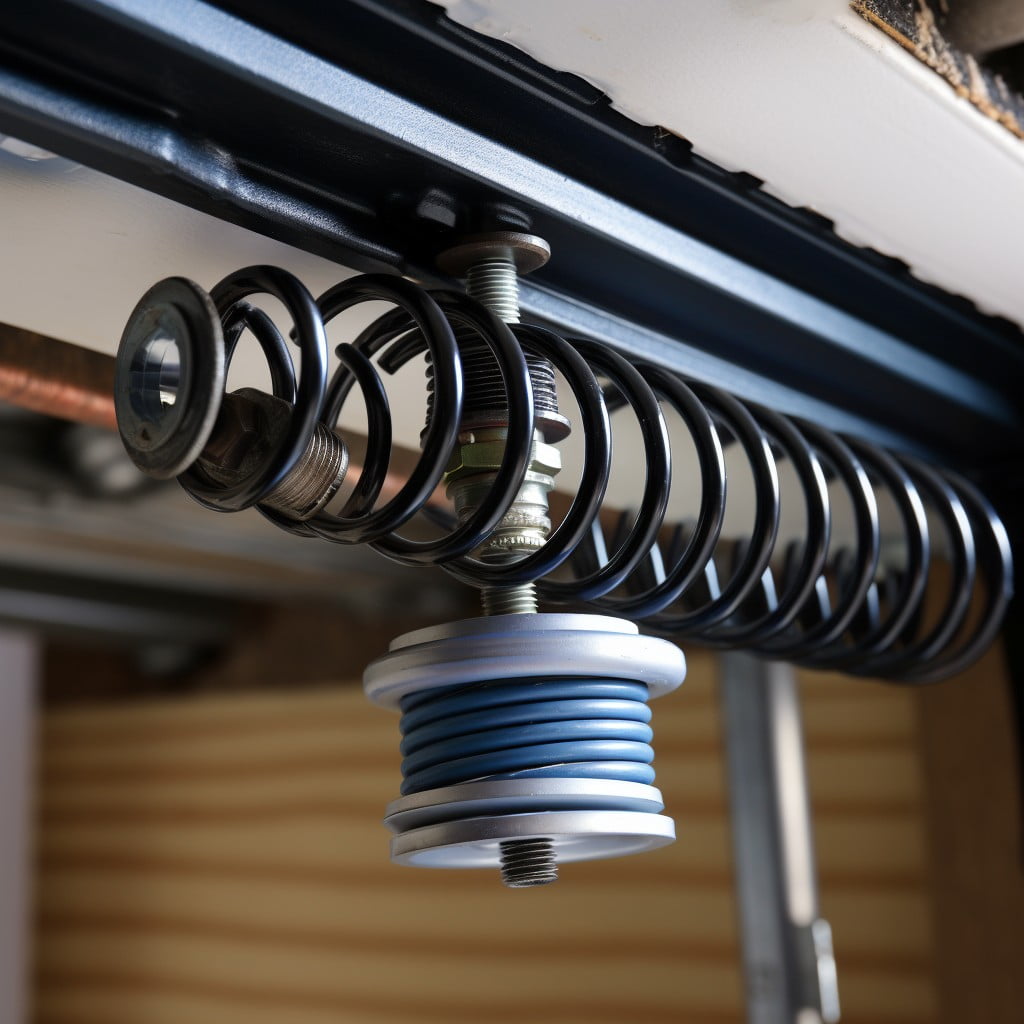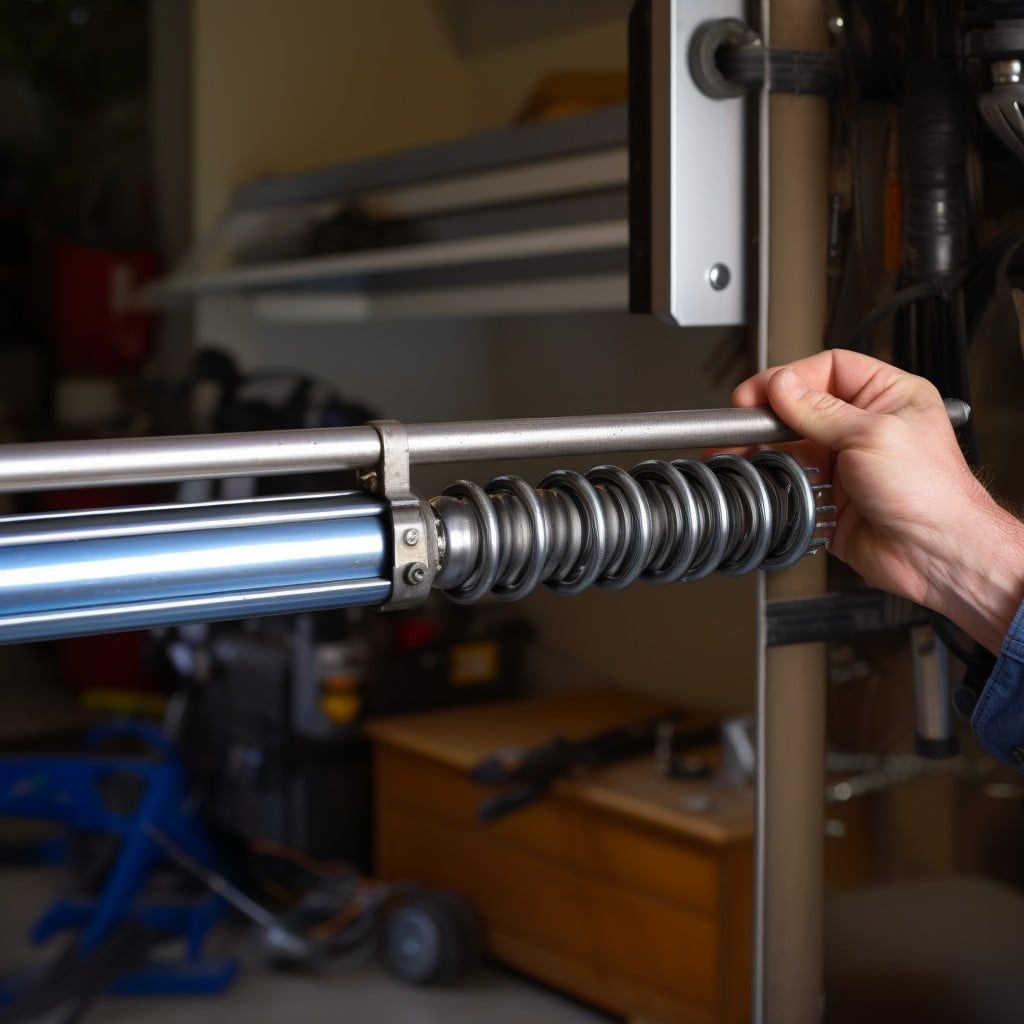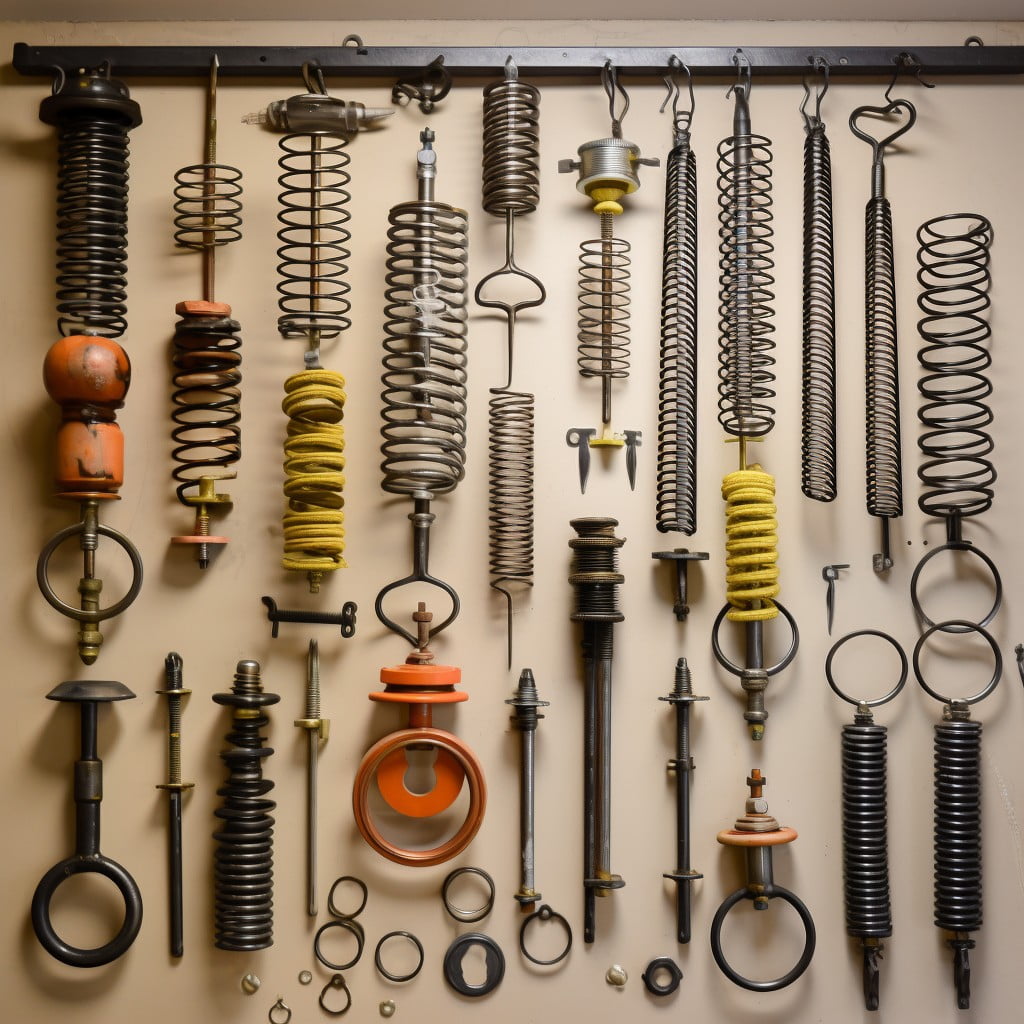Garage door springs, integral to the functionality of your garage, have a lifespan that depends on several factors such as usage rate and maintenance.
Garage door springs, a pivotal component in the functioning of your garage, typically have a lifespan of 7 to 9 years, assuming they’re used around 4 times daily.
This duration can vary based on the quality of the spring, its maintenance, and the frequency of garage door usage.
Continue reading to delve into the factors that affect their longevity, tips for maintenance, and signs of wear and tear that signal replacement time.
This comprehensive guide will equip you with all the knowledge you need about the lifespan of garage door springs.
Key takeaways:
- Garage door springs typically last 7 to 9 years.
- Factors affecting lifespan include maintenance, usage, and quality.
- Torsion springs generally last 5 to 7 years with average use.
- Signs of wear include stretched coils and difficulty opening/closing.
- Choose the right springs based on size and quality.
Garage Door Torsion Spring Life Expectancy

Typically, these integral components can last anywhere between five to seven years, depending on usage. This is based on an average usage rate of four cycles per day, equating to approximately 10,000 cycles before potential failure.
However, many factors come into play in determining the actual longevity of a garage door spring. Firstly, the quality of the spring itself substantially influences its lifespan, with higher-quality springs tending to have a longer service life.
Regular maintenance can also significantly extend a spring’s life expectancy, by preventing premature wear and tear. Notably, while they generally serve a lengthy term, all springs will eventually wear out over time due to the stress and tension they regularly withstand.
Therefore, routinely monitoring your garage door and its springs is vital to ensure optimal operation.
What Affects the Lifespan of a Garage Door Torsion Spring

Three core elements play a significant role in determining the lifespan of a torsion spring: maintenance, usage, and mechanical quality.
1. Maintenance: Timely servicing is crucial. A well-maintained spring can prevent early wear and tear, extending lifespan. Regular lubrication and inspection for rust can significantly increase its longevity.
2. Usage: How frequently you open and close your garage door influences the spring’s lifespan. High usage accelerates wear, shortening the spring’s lifespan.
3. Mechanical Quality: A high-quality, properly installed torsion spring tends to last longer than a substandard one. Therefore, it may be beneficial to invest in a good-quality spring, even if it’s more expensive upfront.
Remember, environmental factors such as harsh weather can also affect the spring’s condition. Being aware of these aspects can help in maintaining the spring effectively and prolonging its life.
How Often Should You Replace Torsion Springs

While there is no definitive timetable, torsion springs tend to need replacing every seven to nine years, based on an estimate of 10,000 cycles. A cycle is defined as your garage door going up and coming down once. If your garage is frequently used, which can mean more than twice daily, the springs may wear out faster, potentially needing replacement after four to six years.
Beyond frequency of use, unbalanced doors can also hasten spring failure. This occurs when one side of the door is heavier, placing uneven pressure on the spring mechanism. Regular maintenance checks can help identify and rectify such issues, prolonging spring life.
Always employ a professional when it’s time to replace the torsion springs. It’s an intricate process requiring accurate adjustments, and inexperienced handling could lead to a hazardous situation.
Choosing the Right Springs

Selecting suitable garage door springs ensures optimal performance, longevity, and safe operation. There are two significant spring types: torsion and extension. Torsion springs are supreme in strength, offer greater balance, and can withstand heavy loads. Generally, they are best suited for double-car garage doors.
In contrast, extension springs are implemented in single-car garage doors due to their smaller size. They are often cost-effective but are less durable and offer less balance than torsion springs.
A crucial aspect to consider when purchasing springs is their cycle life, typically rated in cycles. For residential use, a 10,000-cycle spring offers an approximate lifespan of 7-9 years with average use.
Finally, material quality should not be overlooked. Springs made from high-quality steel with corrosion-resistant coating will offer better performance and longevity.
Remember, each garage door is unique based on weight, height, and track configuration, and requires different spring types and sizes. It’s advisable to consult with a garage door professional to ensure the correct springs for your specific needs are chosen.
Signs It’s Time to Replace Torsion Springs
Noticeable wear and tear is a telltale indication that your spring may need replacement. If the coils appear stretched or if there are gaps between them, they are likely past their prime. A second major indicator is difficulty in opening and closing the door. If you find that your garage door is less smooth than usual in its motion, or especially if it’s outright stuck, the problem may reside with the springs.
Often, an old spring will make significant noise. If you’re hearing loud squeaks or grinding sounds when the door is in motion, it’s a surefire sign the torsion springs may need replacing. Finally, pay attention to balance. If you spot the door slanting to one side or the other or not fully opening, the culprit can be an old spring. Just remember, it’s always recommended to call a professional for a proper diagnosis and replacement to maintain safety.
Potential Problems With Garage Door Springs
Unexpected breakdowns, sensitive operation, and compromised safety are merely a few issues that can arise due to worn out springs. Springs in poor condition can cause the garage door to become imbalanced, leading to uneven opening, or in worse cases, the door coming off the track. Another prevalent issue involves stress on the garage door opener. As the springs lose their strength, the opener must work harder, ultimately shortening its lifespan.
The garage door may also become noisy, producing rumbles, squeaks or vibrations that are not common in a smoothly functioning door. In extreme cases, fatigued springs can snap and cause injury or property damage. As tension mounts within the springs trying to balance the weight of the door, their breakage can lead to sudden, hazardous, high-velocity shattering.
Finally, compromised torsion springs reduce the energy efficiency of your home. An imbalanced or unevenly sealed door lets out heat during colder months, causing an increase in energy costs. Always keep a close eye on signs of wear and tear of these indispensable door components. Regular preventive maintenance and professional assessment help mitigate these challenges, ensuring the quiet, efficient operation of garage doors.
Additional Resources On Garage Door Springs
To delve deeper into the topic, there are plenty of resources available. Manufacturer’s guides are particularly useful as they provide detailed, product-specific information. Professional blogs and articles on garage door maintenance are a solid source of practical advice. Online videos, especially those made by professionals, are beneficial for visual learners. For complex issues and in-depth understanding, consider joining forums where industry experts and experienced DIY-ers share advice and solutions for common challenges. And finally, don’t forget offline sources such as hardware store experts who are often a wealth of knowledge on the subject.
FAQ
What's the average life of a garage door spring?
The average lifespan of a garage door spring ranges between 7 to 10 years, given that the door usage conditions and installation were correct.
Do garage door springs need to be replaced?
Yes, garage door springs do need to be replaced, usually after about 10,000 open and close cycles, or roughly seven to nine years of regular use.
How long does a torsion spring last on a garage door?
A torsion spring on a garage door typically lasts between 7 to 12 years, depending upon the number of cycles from 5,000 to 20,000.
What are the signs that a garage door spring needs replacement?
Signs that a garage door spring needs replacement include a heavily strained door, uneven opening or closing, visible wear and tear, or loud noises during operation.
What factors can affect the longevity of garage door springs?
The longevity of garage door springs can be affected by factors such as the quality of the material, frequency of use, proper maintenance, and the local climate conditions.
Is there a difference in lifespan between extension and torsion springs in garage doors?
Yes, torsion springs tend to have a longer lifespan than extension springs in garage doors.